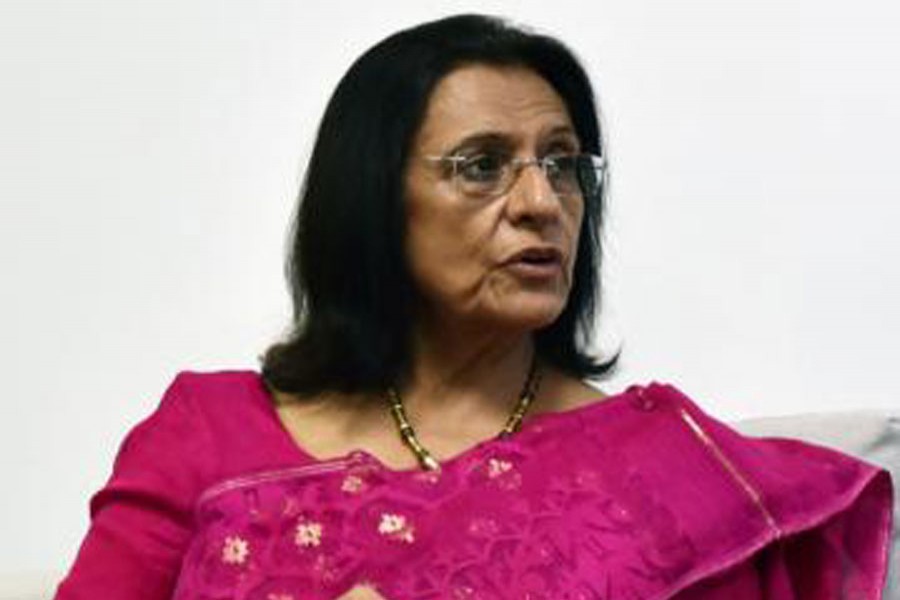The World Health Organisation (WHO) has appealed for more donor supports for Rohingyas ahead of monsoon, fearing the tropical season to expose the forcibly displaced Myanmar population in Bangladesh to intensified health risks.
"For us it (monsoon) is a great worry," WHO's Regional Director for South-East Asia Dr Poonam Khetrapal Singh told BSS in an interview, a day after she visited the improvised and crowded Rohingya camps in Cox's Bazar bordering Myanmar's Rakhine State, their homeland.
She said WHO launched a second appeal for expanded international help for the Rohingyas ahead of the rainy season while it simultaneously planned to start a fourth round of vaccination to prevent the possible outbreak of cholera epidemics in Rohingya camps.
The WHO regional chief particularly expressed concerns about the poor sanitation system at the camp scene saying "for now, it is manageable, but when rain starts sanitation will be a big challenge".
"Help is coming, sentiment of help is there in Geneva," she said referring to the prospects of donor response to the appeal analysed in WHO headquarters in the Swiss city.
The regional chief of World Health Organisaiton for the region (WHO-SEARO) is in Bangladesh on a four-day visit to witness the crisis involving the Myanmar's ethnic population who fled their home to evade military atrocities.
The UN called the Myanmar military actions "a textbook example of ethnic cleansing" and rights groups described as genocide.
Earlier today Khetrapal Singh called on Prime Minister Sheikh Hasina and held a meeting with representatives of donor agencies in Dhaka on resource mobilisation as part of health care preparation on the face of impending dangers to be faced by the Rohingyas.
Currently, she said, WHO was spending US$1million every month to extend health care supports to Rhingyas but the global health body was prepared to enhance the amount if the situation deserved.
Khetrapal Singh said three rounds of diphtheria, measles and cholera vaccines were administered in Rohingya camps as "this (vaccination), I thought is very useful, because the greatest worry is of course monsoon".
"We will go for another round of vaccination after the fourth one and we have enough stock of vaccine at the camps . . . WHO has assessed the risk and procured the vaccine," she said.
The WHO official, however, expressed concerns about continued Rohingya influx saying "they are still coming. It has not stopped, it's still going on".
Khetrapal Singh said the situation prompted her organisation to go for repeated rounds of vaccination so no one of them was left out and exposed to breakout of water born diseases.
Currently, she said WHO was giving highest level priority under its World Health Emergency (WHE) programme to address the Rohingyas health concerns.
The WHO regional chief, however, said during the every rounds of vaccination they covered the host community in the neighbourhood and "whenever we will go for vaccination next time we will cover the entire area as well".
She highly lauded Bangladesh government role in handling the crisis offering refuge to over one million Rohingyas on humanitarian grounds.
"Bangladesh government is doing a lot, it's not easy. There are over a million people (Rohingya) . . . its like (the entire population of) another country," the WHO official said.
Asked for comments about Bangladesh's repeated call seeking sustained international pressure on Myanmar to stop atrocities and return the Rohingyas, she said the WHO generally "doesn't intervene internal or regional politics".
But, she said, if required, WHO could join the campaign from the UN platform along with other agencies.
The Rohingya issue required Bangladesh to engage, among other resources, some 28,000 manpower to work round-the-clock for their management and services.
Khetrapal Singh, an Indian national, became the first woman to assume the office of WHO Regional Director for South-East Asia on 1 February 2014.


